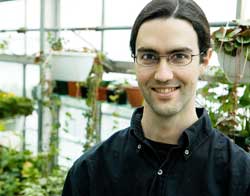Damon Matthews: Chasing climate change

Damon Matthews (Geography) uses computer models to analyze the effect of greenhouse gas emissions.
rob maguire
One of the participants in the largest international audit of peer-reviewed research on climate change has joined the ranks of Concordia’s Geography, Planning and Environment Department.
Assistant professor Damon Matthews, who contributed to the Fourth Assessment Report of the Intergovernmental Panel on Climate Change (IPCC), is unequivocal about the impact of human activities on global temperature.
“Climate change is real, it is happening, and it’s partly our fault,” he said, adding that “climate change” is a more accurate term than “global warming.”
“It’s not just a question of warming. Different parts of the globe warm at different rates, while others have cooled. Some parts of Antarctica, for example, have cooled, in part due to ozone depletion.”
Using computerized climate models, Matthews is currently studying the resilience of the Earth’s carbon sinks to find out precisely how much carbon dioxide we can emit if we want to stabilize levels of carbon dioxide in the atmosphere.
Computer modelling allows climatologists to make fairly accurate predictions about the long-term effects of greenhouse gas emissions. These models track the intricate dance of natural processes and human activities, taking into account a host of factors such as the amount of vegetation, the condition of sea ice, and ocean circulation.
“[Computer modelling] enables us to marry traditional concerns with modern technology,” said Alan Nash, chair of the Geography.
Matthews hopes to broaden the scope of existing models by incorporating the life cycles of phosphorous and nitrogen. While neither has been widely studied, both affect plant growth, which in turn affects how much carbon dioxide the Earth is able to store. Emissions from deforestation activities comprise about one quarter of all carbon dioxide emissions globally.
Deforestation affects climate in two ways. One way is to release carbon dioxide. The other is to alter the reflectivity of the surgace.
Matthews is aware that his area of study has been thrust into the centre of a media maelstrom, and blames most media coverage for polarizing the public debate.
“There’s a perception in the media that you need to cover both sides of the story, but in this case, both sides aren’t equitable,” he said.
“We have several thousand scientists out there telling us climate change is real, and a handful of prominent spokespeople who characterize themselves as ‘climate skeptics’ who seek to discredit the research.”
In addition to his research on the carbon cycle, Matthews is teaching a brand new course called Climate Change: Science, Impacts and Policy.
Offering the course is a logical extension of the department’s mission to provide students with a “critical apparatus” to make informed decisions about the world they live in, according to Nash, who pointed out that geographers were the canaries in the climate change coal mine.
“We’ve been out there banging the drum even before others picked up on these things.”
Nash believes the department’s “healthily increasing” enrolment figures are a testament to enduring student interest in environmental issues.
“Our job is to give students the skills they need to deal with what’s happening,” he said.